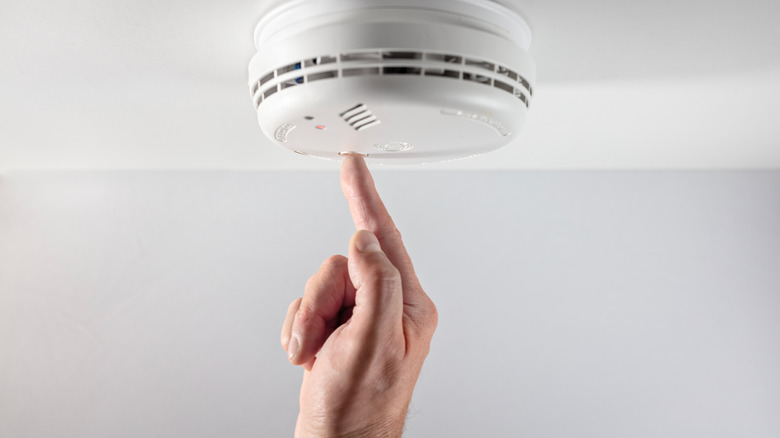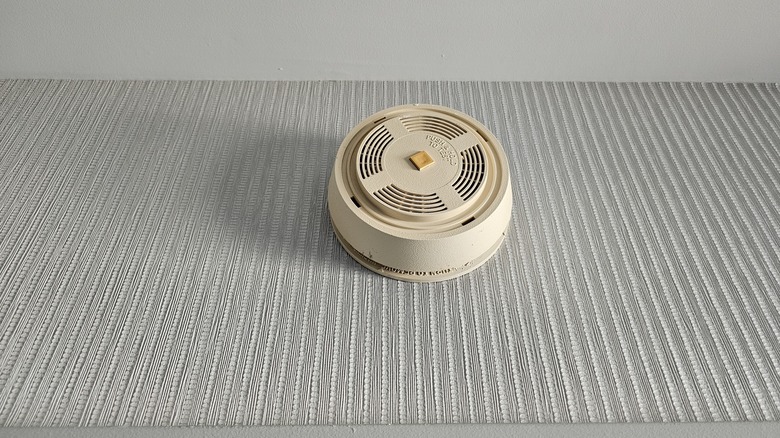How Long Smoke Detectors Typically Last (& Signs It's Time For A Replacement)
We may receive a commission on purchases made from links.
The safety and well-being of your family isn't something that you should leave to chance, so it's important to ensure all safety and security features of your home are well-maintained and in working order at all times. While you should also be taking steps to eliminate common fire hazards in your home, one thing that you should pay close attention to is your home's smoke detectors.
Most homeowners know that smoke detector batteries need to be replaced from time to time, usually once a unit starts chirping at regular intervals. However, most manufacturers also recommend replacing the entire smoke detector every 10 years, or whenever it begins showing the slightest signs of malfunctioning. They should be completely replaced every 10 years. Fortunately, there are signs you can look for to determine whether it's time for a total replacement or not. Some things you might want to pay attention to are the alarm going off randomly, the detector chirping endlessly even after new batteries have been installed, or the test button failing to work as it should.
How to tell if you need to replace a smoke detector
There are a variety of things to look for to determine whether your smoke detector is in need of a replacement. Although a chirping smoke alarm can indicate a need for battery replacement, it may also chirp for other reasons. You may notice problems with increased sensitivity if it's time for a replacement — for instance, it may beep if there are humidity and temperature changes, if there's a lot of dust around, or if there are problems with the smoke detector.
Similarly, if there are full-scale false alarms with the smoke detector and it tends to go off for no reason, you probably need to replace it. The test button may also fail to work as it should. Take note if the smoke detector doesn't beep immediately after pressing the button, if it beeps too quietly, or if it doesn't respond at all.
In addition to these issues, another major sign that the smoke detector needs a replacement is if it has yellow discoloration. A smoke alarm may turn yellow once the flame-retardant bromine material in the alarm's casing degrades. This doesn't affect the functionality itself, but indicates that the unit is probably been up for quite a while. The general rule is to replace smoke detectors every 10 years and a yellow unit is probably getting pretty close to this point.
Choosing the right smoke detectors for your home
If it turns out that you need to replace your home smoke detectors, luckily, it's usually a straightforward process. First, consider the differences between battery-operated vs. hardwired smoke detectors when making your choice. If you have a hardwired smoke detector, you may need to call an electrician to help with the replacement, but you can easily replace a battery-powered smoke detector on your own. Just pick one up from a local hardware store.
While you're replacing your smoke detector, consider how long your new one will last. Check the manufacturing date on the packaging, and keep in mind that it should be replaced 10 years after the listed date. Some smoke detectors will have a built-in lithium battery that will last 10 years, but others will need to have batteries replaced every six months or so. Smoke alarms and carbon monoxide detectors often go hand-in-hand, so consider buying a smoke detector with carbon monoxide detection or simply buy separate units for this purpose. Combo smoke and carbon monoxide detector systems typically need to be replaced every five to seven years.
You might also want to look for a smoke detector with special features. Smart smoke detectors such as the Google Nest Protect can allow you to manage them easily and get alerts through an app. Don't forget to get a sufficient number of smoke detectors for your home. At minimum, you should have one for every level of your house and one in every bedroom. Make sure they are all up-to-date and replaced when necessary.


